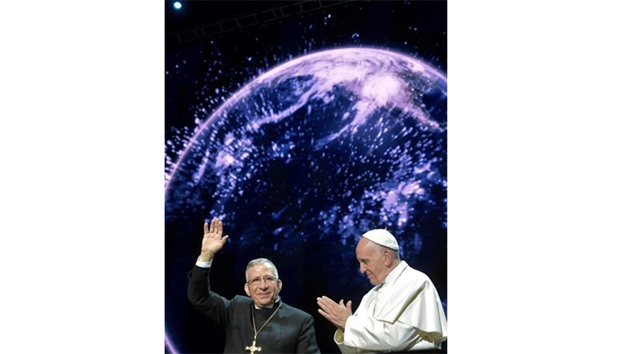Pope Francis recognised yesterday the positive aspects of the Reformation sparked by Martin Luther in a further gesture of reconciliation to Lutherans, who split with Rome 500 years ago.
Francis, the first Pope to visit Sweden in nearly 30 years, made his comments during a historic joint prayer service in the Lutheran cathedral of Lund, where he also said both Lutheran and Catholic Churches should mend past errors and seek mutual forgiveness.
“We too must look with love and honesty at our past, recognising error and seeking forgiveness, for God alone is our judge,” Francis said, speaking in the cathedral which was confiscated from Catholics after Lutheranism became the state religion in 16th century.
Martin Luther, a German monk, started the Reformation in 1517 when he wrote 95 theses criticising the Catholic Church for corruption in Rome, including the buying of ecclesiastical privileges, nepotism, usury and the selling of indulgences.
It led to a violent, often political schism throughout Europe and Christianity, prompting among other things the 30 Years’ War, the destruction of English monasteries, and the burning of numerous “heretics” on both sides.
In his address during the joint prayer service held in the city where the Lutheran World Federation was founded, Francis acknowledged that some good came from Luther and the Reformation, particularly his emphasis on the Gospel.
“With gratitude we acknowledge that the Reformation helped give greater centrality to sacred scripture in the (Catholic) Church’s life,” he said.
That was bound to upset conservative Catholics, who believe their church has already conceded too much to Lutherans and should not be taking part in events that praise him.
The leader of the Catholics has called Luther “an intelligent man” who was rightly upset by the corruption, worldliness, greed and lust for power that existed in the church at the time.
Sweden is one of the world’s most secular nations and that was evident near the cathedral, where around 100 students, some wearing mock papal hats, drank beer outside during the service.
“We Swedes are not that religious,” said Sebastian Nielson, a 23 year-old student.
Theological dialogue between Catholics and Lutherans began 50 years ago but they are still officially not allowed to take communion at each other’s services.
Some were hoping for a breakthrough during the visit.
But a joint statement effectively re-stated the status quo, while saying that both churches were committed to trying to solve the issue.
When he visited Rome’s Lutheran church last year, traditionalists attacked Francis for suggesting to a Lutheran woman married to a Catholic man that she could decide in good conscience if she could take communion in her husband’s church.
The deep resentment and rifts left by the Reformation began easing after the 1962-1965 Second Vatican Council urged dialogue with other Christians in the hopes of one day achieving reunion.
Doctrinal difficulties include the fact that many national Lutheran churches have women priests and bishops.
Archbishop Antje Jackelen, a German-born woman, heads the Church of Sweden and was at the Lund service.
Yesterday’s joint statement said both churches should not let their doctrinal differences stop them from working together on social issues such as poverty and migration.

Pope Francis with Lutheran World Federation president Bishop Munib Younan at the Malmo Arena in Malmo.
